小升初英语英语学习 形容词与副词的比较级及变化规则
- 格式:doc
- 大小:14.64 KB
- 文档页数:4
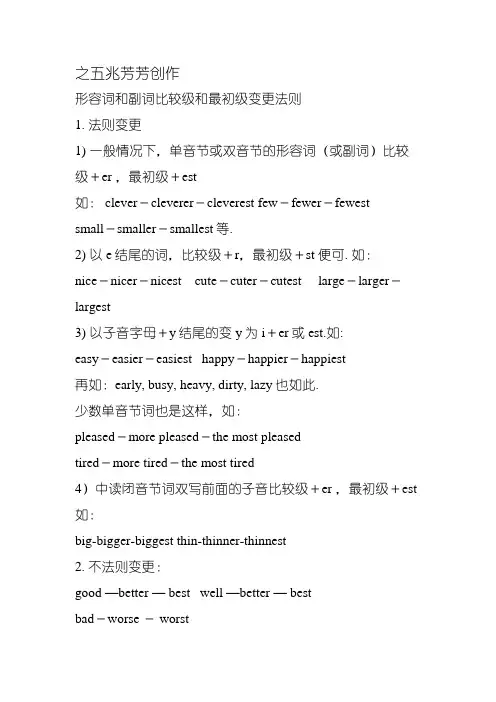
之五兆芳芳创作形容词和副词比较级和最初级变更法则1. 法则变更1) 一般情况下,单音节或双音节的形容词(或副词)比较级+er ,最初级+est如: clever-cleverer-cleverest few-fewer-fewestsmall-smaller-smallest等.2) 以e结尾的词,比较级+r,最初级+st 便可. 如:nice-nicer-nicest cute-cuter-cutest large-larger-largest3) 以子音字母+y结尾的变y为i+er或est.如:easy-easier-easiest happy-happier-happiest再如:early, busy, heavy, dirty, lazy也如此.少数单音节词也是这样,如:pleased-more pleased-the most pleasedtired-more tired-the most tired4)中读闭音节词双写前面的子音比较级+er ,最初级+est 如:big-bigger-biggest thin-thinner-thinnest2. 不法则变更:good —better — best well —better — bestbad-worse - worstmany / much — more — mostfar — farther —farthest (距离远)far — further — furthest (程度深)old — elder — eldest (长幼)old — older —oldest (年龄)Step 2 中考链接1. 比较级考点①比较级修饰问题a little, a bit, even, still, much, a lot, far 等可修饰比较级.e.g. Tom is a little taller than Jim.This book is much more interesting than that one.②同级比较e.g. The weather in Beijing is colder than that in Xi’an.Our school is bigger than yours.③ the + 比较级e.g. Lucy is the fatter of the two girls.④“a/an + 比较级” 暗示“又一,再一”e.g. Lily has a doll, but she wants a bigger one.⑤隐性比较(没有than的情况)e.g. Who runs faster, Lucy or Lily?You’d better come earlier next time.He worked hard last term, but he works even harder this term.⑥越来越......a. 比较级 + and + 比较级b. the + 比较级 + 句子,the + 比较级 + 句子a. e.g. It’s getting colder and colder.The more you exercise, the better you are.2. 最初级考点说明:形容词的最初级前必须加the; 副词的最初级前省略the.①规模问题e.g. Tom is the tallest student in the class.Spring is the best season of the year.②“......之一”问题e.g. Beijing is one of the biggest cities in the world.③“the + 序数词 + 最初级”e.g. I think he is the second tallest boy in his class.3. 比较级和最初级的转换e.g. Tom is the tallest student in the class.= Tom is taller than any other student in the class.= Tom is taller than all the other students in the class.= No other students are taller than Tom.2. 同级比较① as + adj./adv. + ase.g. She is as thin as Lily.He writes as carefully as Linda.② not + as/so + adj./adv. + ase.g. Tony didn't run so fast as Carter中考真题1. Our family has bought a car so we can travel _____ than before.A. most easilyB. less easilyC. easilyD. more easily2. My father told me a story last night. It is ____ one I’ve ever heard.A. the funniestB. funniestC. funnierD. the funnier3. The _____ friends you have, the ____ you will be.A. more, happyB. many, happyC. more, happierD. many, happier4. When he heard a cry for help, he ran out as _______ as he could.A. hardlyB. quicklyC. finallyD. slowly5. This place is not big enough f or Lucy’s birthday party. We should find a _____ one.A. bigB. smallC. biggerD. smaller。
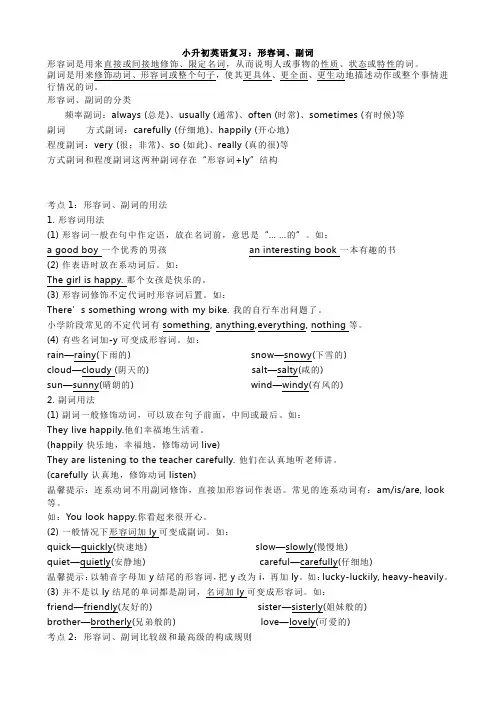
(1) “A + be +形容词比较级+ than + B”意思为“A比B更……”。
如:My pen is cheaper thanyours . 我的笔比你的便宜。
Tom runs faster thanyou. 汤姆比你要跑得快。
(2) 进行选择性比较时,可用“which/ who+be+形容词比较级,A or B ?”表示“A和B中,哪一个/ 谁更……..?”。
如:Who is taller (tall), Lucy or Lily? 露西和丽莉谁更高?(3) “比较级 + and + 比较级”或“more and more +原级”表示“越来越……”如:It becomes warmer and warmer when spring comes.春天来了,天气变得越来越暖和了。
(4) “the +比较级……, the+比较级......”,表示“越……越……”如:The more money you make, the more you spend.钱你赚得越多,花得越多。
温馨提示:a bit, a little, much, a lot, still, even 可修饰形容词或者副词的比较级。
Peter is much taller(tall) than Daming. 彼得比大明高得多。
(三) 最高级用法形容词、副词的最高级形式主要用来表示三者或三者以上人或事物的比较,表示“最……”的意思。
句子中有表示范围的词或短语。
如:of the three, in our class等。
结构:(1) Who + be + the + 形容词最高级,A, B or C? 表示“ABC中谁最…..?”Who is the most beautiful (beautiful)girl, Lily, Lucy or Lingling?丽莉、露西和玲玲谁是最漂亮的?(2) Which + be + the + 形容词最高级,A, B or C? 表示“ABC中哪一个最…..?”Which bag is the heaviest(heavy), the yellow one, the red one or the black one?哪个包包最重,黄色的,红色的还是黑色的?(3) A + 谓语 + the + 形容词/副词最高级 + 表示范围的短语(of/ in…) .表示“A在哪一范围内是最…..?”如:He is the tallest (tall) in our class. 他在我们班里是最高的。
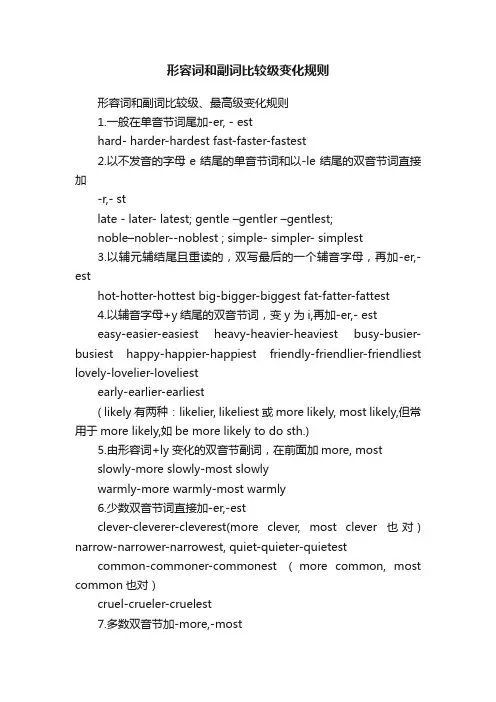
形容词和副词比较级变化规则形容词和副词比较级、最高级变化规则1.一般在单音节词尾加-er, - esthard- harder-hardest fast-faster-fastest2.以不发音的字母e结尾的单音节词和以-le结尾的双音节词直接加-r,- stlate - later- latest; gentle –gentler –gentlest;noble–nobler--noblest ; simple- simpler- simplest3.以辅元辅结尾且重读的,双写最后的一个辅音字母,再加-er,-esthot-hotter-hottest big-bigger-biggest fat-fatter-fattest4.以辅音字母+y结尾的双音节词,变y 为i,再加-er,- esteasy-easier-easiest heavy-heavier-heaviest busy-busier-busiest happy-happier-happiest friendly-friendlier-friendliest lovely-lovelier-loveliestearly-earlier-earliest( likely有两种:likelier, likeliest或more likely, most likely,但常用于more likely,如be more likely to do sth.)5.由形容词+ly变化的双音节副词,在前面加more, mostslowly-more slowly-most slowlywarmly-more warmly-most warmly6.少数双音节词直接加-er,-estclever-cleverer-cleverest(more clever, most clever也对) narrow-narrower-narrowest, quiet-quieter-quietestcommon-commoner-commonest (more common, most common也对)cruel-crueler-cruelest7.多数双音节加-more,-mostcareful –more careful - most carefuluseful-more useful-most usefulactive-more active-most active often-more often –most oftenexact--more exact –most exact8.不规则变化级good/well - better - best ,bad/badly/ill - worse - worstmany/much - more - most ,little -less -leastfar - farther/further - farthest/furthest ,old - older/elder - oldest/eldest特别提醒:◇farther指“距离更远”,further指“程度更深”。
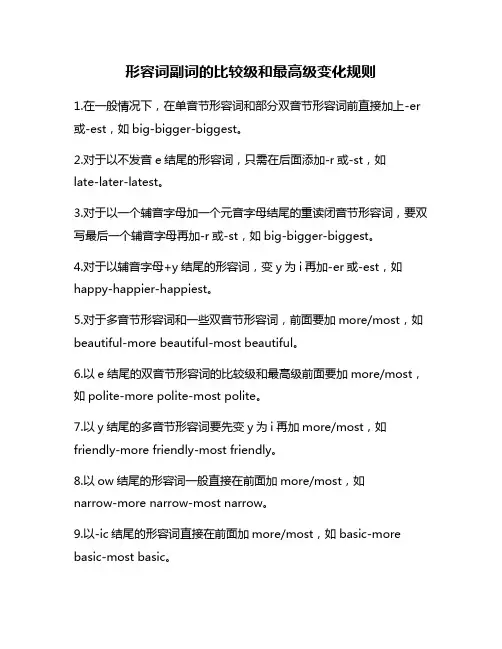
形容词副词的比较级和最高级变化规则1.在一般情况下,在单音节形容词和部分双音节形容词前直接加上-er 或-est,如big-bigger-biggest。
2.对于以不发音e结尾的形容词,只需在后面添加-r或-st,如late-later-latest。
3.对于以一个辅音字母加一个元音字母结尾的重读闭音节形容词,要双写最后一个辅音字母再加-r或-st,如big-bigger-biggest。
4.对于以辅音字母+y结尾的形容词,变y为i再加-er或-est,如happy-happier-happiest。
5.对于多音节形容词和一些双音节形容词,前面要加more/most,如beautiful-more beautiful-most beautiful。
6.以e结尾的双音节形容词的比较级和最高级前面要加more/most,如polite-more polite-most polite。
7.以y结尾的多音节形容词要先变y为i再加more/most,如friendly-more friendly-most friendly。
8.以ow结尾的形容词一般直接在前面加more/most,如narrow-more narrow-most narrow。
9.以-ic结尾的形容词直接在前面加more/most,如basic-more basic-most basic。
10.以-ive结尾的形容词直接在前面加more/most,如active-more active-most active。
11.以-able结尾的形容词直接在前面加more/most,如comfortable-more comfortable-most comfortable。
12.以-ful结尾的形容词直接在前面加more/most,如beautiful-more beautiful-most beautiful。
13.以-al结尾的形容词直接在前面加more/most,如usual-more usual-most usual。

形容词和副词的原级、比较级和最高级知识点一、定义形容词和副词有三个等级,即原级、比较级和最高级。
比较级主要用于两者之间作比较,最高级主要用于三者或三者以上进行比较。
二、形容词和副词的比较级与最高级的变化规则三、重要句式原级句式(1)as+原级+as...像...一样not as/so+原级+as不如I am as tall as Yao Ming.我和要命一样高。
I am not so tall as Yao Ming.我不如姚明高。
(2)A+谓语动词+倍数+as+原级+as B,表示"A是B的……倍"Our school is twice as large as theirs.我们学校是他们学校的两倍大。
比较级句式(3)a little,a bit,a lot,much,even+比较级,表程度。
Yao Ming is much taller than you.姚明比你高多了。
You are even shorter than me.你甚至比我还矮。
The weather today is a lot warmer than it was yesterday.今天的天气比昨天暖和多了。
(4)比较级+and+比较级,表示"越来越……,”多音节词和部分双音节词用"more and more+原级"It’s becoming colder and colder.天气变得越来越冷了。
The problem is becoming more and more serious.问题变得越来越严重了。
(5)the+比较级,the+比较级,表示"越……就越……"The more you eat,the fatter you will be.吃得越多,就越胖。
(6)比较级常见句式:Which/Who+谓语动词+比较级,A or B?Who runs faster,Jim or Tom?谁跑得更快,吉姆还是汤姆?A+谓语动词+比较级+than B...A比B……My bike is bigger than hers.我的自行车比她的大。
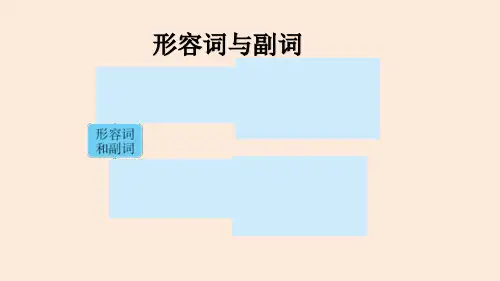
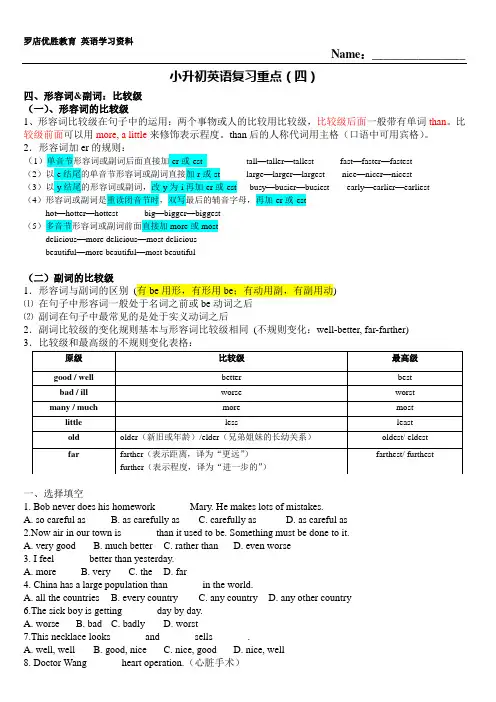
小升初英语复习重点(四)四、形容词&副词:比较级(一)、形容词的比较级1、形容词比较级在句子中的运用:两个事物或人的比较用比较级,比较级后面一般带有单词than 。
比较级前面可以用more, a little 来修饰表示程度。
than 后的人称代词用主格(口语中可用宾格)。
2.形容词加er 的规则:(1)单音节形容词或副词后面直接加-er 或-est tall —taller —tallest fast —faster —fastest(2)以-e 结尾的单音节形容词或副词直接加-r 或-st large —larger —largest nice —nicer —nicest(3)以-y 结尾的形容词或副词,改-y 为-i 再加-er 或-est busy —busier —busiest early —earlier —earliest(4)形容词或副词是重读闭音节时,双写最后的辅音字母,再加-er 或-esthot —hotter —hottest big —bigger —biggest(5)多音节形容词或副词前面直接加more 或mostdelicious —more delicious —most deliciousbeautiful —more beautiful —most beautiful(二)副词的比较级1.形容词与副词的区别 (有be 用形,有形用be ;有动用副,有副用动)⑴ 在句子中形容词一般处于名词之前或be 动词之后⑵ 副词在句子中最常见的是处于实义动词之后2.副词比较级的变化规则基本与形容词比较级相同 (不规则变化:well-better, far-farther)3.比较级和最高级的不规则变化表格:一、选择填空1. Bob never does his homework ______ Mary. He makes lots of mistakes.A. so careful asB. as carefully asC. carefully asD. as careful as2.Now air in our town is ______ than it used to be. Something must be done to it.A. very goodB. much better C . rather than D . even worse3. I feel ______ better than yesterday.A. moreB. veryC. theD. far4. China has a large population than ______ in the world.A. all the countriesB. every countryC. any countryD. any other country6.The sick boy is getting ______ day by day.A. worseB. badC. badlyD. worst7.This necklace looks ______ and ______ sells_______.A. well, wellB. good, niceC. nice, goodD. nice, well8. Doctor Wang ______ heart operation.(心脏手术) 原级比较级 最高级 good / wellbetter best bad / illworse worst many / muchmore most littleless least oldolder (新旧或年龄)/elder (兄弟姐妹的长幼关系) oldest/ eldest far farther (表示距离,译为“更远”)further (表示程度,译为“进一步的”) farthest/ furthestA. is interested onB. like doingC. does well inD. is good at9.The population of Shandong is ______ than that Sichuan.A. smallerB. largerC. lessD. large10.I didn’t go shopping yesterday. He didn’t ______ _.A. soB. eitherC. tooD. neither11. ______ delicious the food is!A. How B . how a C. What D. What a12. What animal do you like ______? I like all kinds of animals.A. betterB. bestC. veryD. well13.Hainan is a very large island. It’t the second ______ island in China.A. largeB. largerC. largestD. most large14.If you want to book a round –trip ticket, you’ll have to pay ______ $30.A. moreB. otherC. the otherD. another15.A horse is ______ than a dog.A. much heavyB. more heavier C .much heavier D. more heavy16.Which is ______ season in Beijing? I think it’s spring.A. goodB. wellC. bestD. the bestually Xiao Li spends ______ time doing homework than Xiao Chen does.A. little B less C. few D. fewer18.I liked to play football when I was young. _______.A. So he wasB. So was heC. So did heD. So he did19.In summer the weather is ____ in Hainan than in Liaoning.A. much hotB. much hotterC. more hotter20. You made a lot of spelling mistakesin the exam. Be ______ next time.A. carefullyB. carefullerC. more careful21. Beijing is ______ than Shenzhen.A. bigB. more bigC. bigger22.I don’t like this film. It’s _____ that one.A. as interesting asB. less interesting asC. more interesting thanD. not as interesting as23. The USA is one of the ______ counties in the world.A. richB. richerC. richest24. Mike is ______ boy in his class and he is _____ than any other student.A. the oldest, tallerB. older, tallerC. the oldest, the tallest25.Of all the books this one is _____.A. usefulB. more usefulC. the most useful二、用括号中形容词的适当形式填空.1. He is _________ ( bad ) at learning maths. He is much _________ ( bad ) a Chinese and he is the _________ ( bad ) at English.2. An orange is a little _________ ( big ) than an apple, but much _________ ( small ) than a watermelon.3. --- Annie plays the piano very ____________ ( well ).--- Sue plays it ____________ ( well ) than Annie.And Sally plays it ____________ ( well ) in her class.4. Saturday is the ____________ ( busy ) day in a week.5. Her mother is getting ____________ ( heavy ) and ____________ ( heavy ).6. I think it’s too expensive(贵的). I’d llike a ____________ ( cheap ) one.7. He comes to school much ____________ ( early ) than I.8. This book is ____________ ( interesting ) than that one.9. Your classroom is ____________ ( wide ) and ____________ ( bright ) than ours.10. Now English is ____________ ( important ) than any other subject, I think.三、小测题( ) 1. I think Yao ming the famous basketball plyer , he will be ____ new Star in NBAA. hotB. hotterC. hottestD. the hottest( ) 2. In our city it’s ____ in July ,but it is even ____ in AugustA. hotter hottestB. hot hotC. hotter hotD. hot , hotter( ) 3. Hainan is a very large Island .It is the second ______ island in chinaA. largeB. largerC. largestD. most largest( ) 4.A horse is ______ than a dogA. much heavyB. more heavierC. much heavier( ) 5. He is ___ enough to carry the heavy boxA. StrongB. strongerC. much stronger .D. the strongest( ) 6. Li lei often talks ___ but does _____ so everyone says he is a good boy.A. less, moreB. few, muchC. more, littleD. little , many( ) 7. When the famous singer started to sing , everyone began to shout very ____A. loudlyB. loudC. heavilyD. high( ) 8. She is ________ than _________。
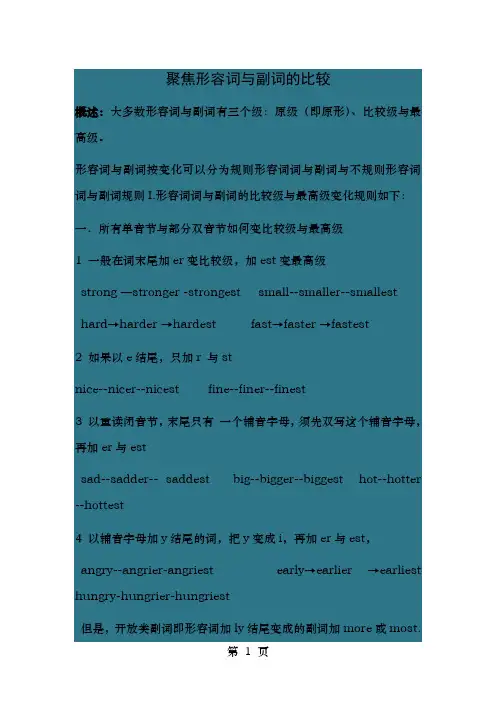
聚焦形容词与副词的比较概述:大多数形容词与副词有三个级:原级(即原形)、比较级与最高级。
形容词与副词按变化可以分为规则形容词词与副词与不规则形容词词与副词规则I.形容词词与副词的比较级与最高级变化规则如下:一.所有单音节与部分双音节如何变比较级与最高级1 一般在词末尾加er变比较级,加est变最高级strong —stronger -strongest small--smaller--smallest hard→harder →hardest fast→faster →fast est2 如果以e结尾,只加r 与stnice--nicer--nicest fine--finer--finest3 以重读闭音节,末尾只有一个辅音字母,须先双写这个辅音字母,再加er与estsad--sadder-- saddest big--bigger--biggest hot--hotter --hottest4 以辅音字母加y结尾的词,把y变成i,再加er与est,angry--angrier-angriest early→earlier →earl iest hungry-hungrier-hungriest但是,开放类副词即形容词加ly结尾变成的副词加more或most.如quickly →more quickly →most quickly quietly →more quietly →most quietlyslowly—more slowly—most slowly[注]:early中的ly不是后缀,故把y变i再加er与est二大部分双音节与所有多音节词都在其前面加more变比较级,加most变最高级different -more different -most differentbeautiful--more beautiful--the most beautifulexpensive--more expensive--the most expensive但是,以形容前缀un结尾的三音节形容词不适合上述情况,如unhappy,untidy,我们可以说:unhappier→unhappiest, untidier→untidiest三,不规则形容词与副词的比较级与最高级good / well -- better-- best badly/bad / ill -- worse -- worstmany/ much-- more--most little -- less-- least far-- farther--farthest 或further--furthestII,形容词与副词的原级、比较级与最高级的基本用法一、原级比较的基本用法:原级比较由“….as+形容词或副词原形+as…”构成译:前者与后者一样eg:Alice is as tall as her younger sister.爱丽丝与她妹妹一样高Liu Dehua sings as well as Joy Zhou刘德华与周杰林伦唱得一样好。
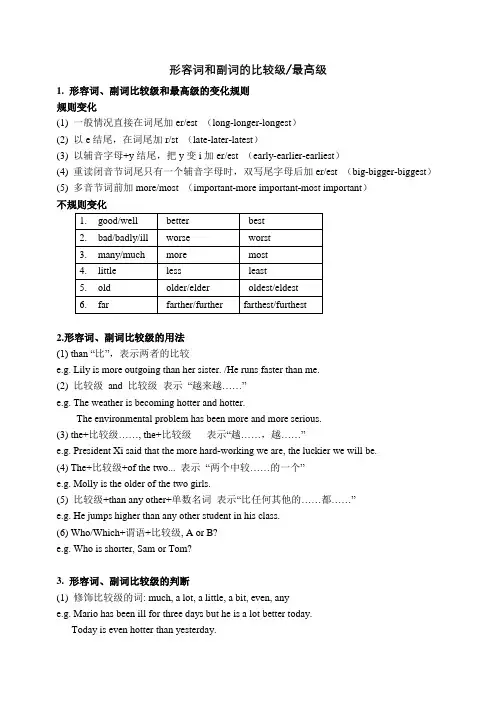
形容词和副词的比较级/最高级1. 形容词、副词比较级和最高级的变化规则规则变化(1) 一般情况直接在词尾加er/est (long-longer-longest)(2) 以e结尾,在词尾加r/st (late-later-latest)(3) 以辅音字母+y结尾,把y变i加er/est (early-earlier-earliest)(4) 重读闭音节词尾只有一个辅音字母时,双写尾字母后加er/est (big-bigger-biggest)(5) 多音节词前加more/most (important-more important-most important)不规则变化2.形容词、副词比较级的用法(1) than “比”,表示两者的比较e.g. Lily is more outgoing than her sister. /He runs faster than me.(2) 比较级and 比较级表示“越来越……”e.g. The weather is becoming hotter and hotter.The environmental problem has been more and more serious.(3) the+比较级……, the+比较级表示“越……,越……”e.g. President Xi said that the more hard-working we are, the luckier we will be.(4) The+比较级+of the two... 表示“两个中较……的一个”e.g. Molly is the older of the two girls.(5) 比较级+than any other+单数名词表示“比任何其他的……都……”e.g. He jumps higher than any other student in his class.(6) Who/Which+谓语+比较级, A or B?e.g. Who is shorter, Sam or Tom?3. 形容词、副词比较级的判断(1) 修饰比较级的词: much, a lot, a little, a bit, even, anye.g. Mario has been ill for three days but he is a lot better today.Today is even hotter than yesterday.(2) 暗含比较级的标志词: be, become, grow, get, makee.g. Computers make our life easier.The weather is becoming colder and colder.4. 形容词、副词最高级的用法(1) 主语+be+the+形容词最高级+in/of/among短语;表示“……是……中最……的……”e.g. My mother is the busiest one in my family.(2) 主语+实义动词(+the)+副词最高级+in/of/among短语;表示“……在……中最……”e.g. Tom works hardest in his class.(3) 主语+be+one of the+形容词最高级+可数名词复数+in/of/among短语;表示“……是……中最……的……之一”e.g. Miss Zhao is one of the most popular teachers in our school.(4) 疑问词+be+the+形容词最高级, A, B, or C? 表示“A,B,C三者中谁最……?”e.g. Who is the tallest, Tom, Sam or Peter?(5) 疑问词+助动词+主语+动词原形(+the)+副词最高级;表示“A,B,C三者中谁……地最……?”e.g. Who jumps the highest, Tom, Sam or Peter?(6) 主语+be+the+序数词+形容词最高级+可数名词单数+in/of/among短语;表示“……是……中第几最……的……”e.g. The Yellow River is the second longest river in China.(7) 主语+be+than any other+可数名词单数= 主语+be+than the other+可数名词复数;表示“比其他任何都……”e.g. The apple is bigger than any other apple on the plate. = The apple is bigger than the other apples on the plate5. 形容词、副词最高级的判断(1) 表示最高级范围的词:in/among/ofe.g. Tony is the tallest of the three boys.(2) 最高级标志词:the(3) 最高级修饰词:形容词性物主代词;序数词e.g. Lily is the second youngest in her class.Ⅱ. 同级比较的用法1. 肯定形式:as+形容词/副词原级+as 表示“和……一样……”e.g. It is reported that Fuxing high-speed train can go as fast as 350 km an hour.2. 否定形式:not as/so+形容词/副词原级+as 表示“不如……”e.g. This movie is not as interesting as that one.【过关检测】1. Who does homework ________ (careful) in your class?2. Who do you think is ________ (funny), Mr. Smith, Mr. Black or Mr. White?3. Anna plays the piano ________ (well) than Susan. And Sally plays it the ________ (well).4. He is one of the _________ (friendly) people in the shopping center.5. Tom is the second ________ (tall) student in his class.6. ______, English, math or Chinese?A. Which do you likeB. What do you like betterC. Which do you like best better7. ---Did Kate do best in the final exam?---No, but of all the students she did ______.A. the most carefulB. carefully enoughC. the most carefully8. ---Which country has the ________ population in the world?---China. It’s a little ________ than that of India.A. most; moreB. biggest; biggerC. bigger; biggest9. ---Tony is only shorter than Jim, right?---Yes, he is ________ student in his class.A. the second tallestB. the two tallestC. second tallest10. ---Tom, what do you think of the school?---Oh, no other school is ________ in the city. It’s ________ one.A. better; a betterB. the best; the bestC. better; the best【课后训练】I. 写出下列单词的比较级和最高级形式Ⅱ. 语法练习1.This story is very ________ (interesting), but that story is ________ (interesting) than this one.2. Nothing is ________ (enjoyable) than playing basketball.3. The yellow bag is the ________ (expensive) of the two bags.4. Which one is ________ (exciting), dog or cat?5. My pocket money is much ________ (much) than yours.6. He felt bad yesterday. But now he feels a lot ________ (good).7. Li Lei draws ________ (badly) than Jim.8. Alice is ________ one of the twins.A. the tallerB. tallerC. tallest9. ________ the mountain is, ________ the air is.B. Higher; thinnerC. The higher; the thinnerA. The highest; thethinnest10. Jack runs ________ than any other student in his school.A. quickB. quicklyC. more quickly。
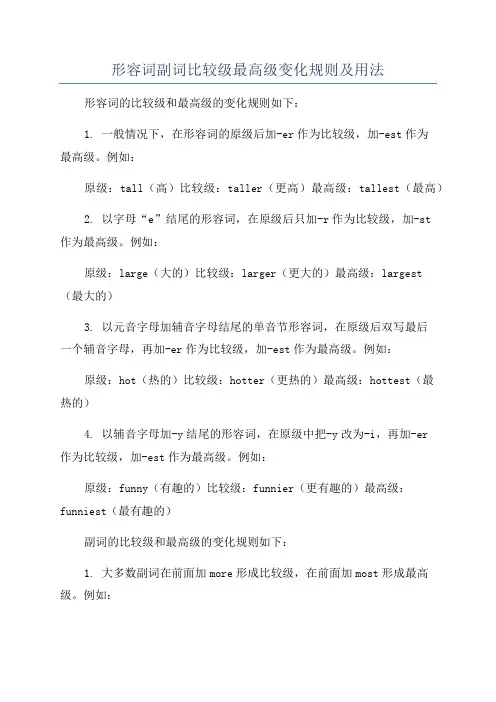
形容词副词比较级最高级变化规则及用法形容词的比较级和最高级的变化规则如下:1. 一般情况下,在形容词的原级后加-er作为比较级,加-est作为最高级。
例如:原级:tall(高)比较级:taller(更高)最高级:tallest(最高)2. 以字母“e”结尾的形容词,在原级后只加-r作为比较级,加-st作为最高级。
例如:原级:large(大的)比较级:larger(更大的)最高级:largest(最大的)3. 以元音字母加辅音字母结尾的单音节形容词,在原级后双写最后一个辅音字母,再加-er作为比较级,加-est作为最高级。
例如:原级:hot(热的)比较级:hotter(更热的)最高级:hottest(最热的)4. 以辅音字母加-y结尾的形容词,在原级中把-y改为-i,再加-er作为比较级,加-est作为最高级。
例如:原级:funny(有趣的)比较级:funnier(更有趣的)最高级:funniest(最有趣的)副词的比较级和最高级的变化规则如下:1. 大多数副词在前面加more形成比较级,在前面加most形成最高级。
例如:原级:quickly(快速地)比较级:more quickly(更快速地)最高级:most quickly(最快速地)2. 以字母“e”结尾的副词,在前面只加-r形成比较级,加-st形成最高级。
例如:原级:late(迟)比较级:later(更迟)最高级:latest(最迟)3. 以字母“y”结尾的副词,在前面把-y改为-i,再加-er形成比较级,加-est形成最高级。
例如:原级:busy(忙碌地)比较级:busier(更忙碌地)最高级:busiest(最忙碌地)需要注意的是,有些形容词和副词的比较级和最高级形式并不遵循以上的规则,而是需要记忆。
例如:good(好的)- better(更好的)- best(最好的), well(好地)- better(更好地)- best(最好地)。
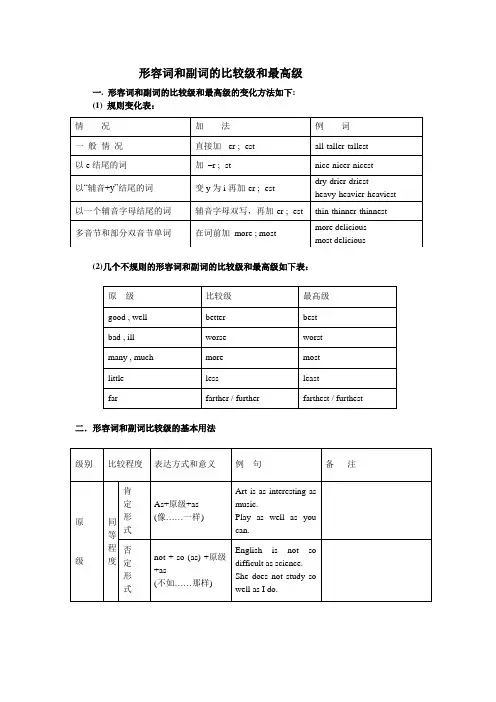
形容词和副词的比较级和最高级一. 形容词和副词的比较级和最高级的变化方法如下:(1) 规则变化表:(2)几个不规则的形容词和副词的比较级和最高级如下表:二.形容词和副词比较级的基本用法三.形容词副词比较级最高级的特殊用法(1)和冠词连用the +形容词原级+v(复),指一类人或物the +形容词比较级,指两者中“较…的”的那一个,eg. the younger of the twoa/ an +形容词比较级eg. The pen is expensive. I want a cheaper one.a+most不是最高级相当于very,修饰其后的名词“非常…”eg. a most beautiful city the+most表示最高级the most wonderful movie(2)序数词与最高级连用,如:Flying is the fastest and the second cheapest way to travel.(3)比较级+than any other +n. (单)(适用于范围一致时)(all) other +n.(复)any +n.(单) (适用于范围不一致时)any other student / all other students in his class.他是他们班最高any student in my class.他比我们班上任何一个同学都高。
(4)倍数表达法。
1. 倍数+ as + 形容词或副词的原级+ as + 其他。
这种结构又常演变成下列两类:①倍数+ as + many + 可数名词复数+ as;②倍数+ as +much + 不可数名词+ as。
如:There are seven times as many people as I expected.是我预料的人数的七倍。
There is five times as much coffee in this glass as in that one.这个杯子里的咖啡是那个杯子里的五倍。
可编辑修改精选全文完整版形容词、副词的比较级与最高级用法详解一、形容词、副词比较级、最高级构成大多数的形容词、副词都具有原级、比较级和最高级三种形式。
而形容词、副词的比较级、最高级构成方式分规则变化和不规则变化。
其规则变化的方式详见下面个表:(一)规则变化:(1) 直接在词尾加-er, -est(2) 以不发音字母e 结尾的,在词尾加-r , -st(3)以“辅音字母+y“结尾的,把y 变i,再加-er , -est(4) 以辅音字母结尾的重读闭音节词汇,双写最后一个辅音字母,再加-er , -est(5) 部分双音节和多音节词,在其前加more, most(二)、不规则变化:比较级、最高级具有不规则变化形式的形容词和副词比较少,因此,需要大家逐一认真记忆。
详见下表:【妙记顺口溜】“坏”“病”两“多”和两“好”,一是“远”来,二是“老”,little 是“少”不是“小”。
二、形容词、副词比较级和最高级用法(一)形容词、副词比较级用法形容词、副词的比较级主要对两个的人或物在某种程度、性质上进行比较。
常见的形容词副词比较级用法如下:1.同级比较① A+be/v+as+原级+as+B A和B一样This room is as large as that one .这间房子和那间一样大(形容词)Tom writes as carefully as Kate.汤姆写字跟凯特一样认真。
(副词)②A+be/V+not+as(so)+级+as +B A 不如BTigers aren't as(so) dangerous as lions.老虎不如狮子危险。
(形容词)Mary didn't finish the work as(so) well as Lucy.玛丽完成这项工作不如露西好。
(副词)2.差极比较①A+be/v+比较级+B A比B更......This pen is newer than that one.这支钢笔比那支新。
2020年小升初英语热点题型一词法(2)形容词、副词、数词【要点归纳】一、形容词【重点】(一)形容词概念形容词是用来修饰物体的形状、大小、长度、属性、特点等,位于名词的前面。
如:1. He is a hard-working student.(努力的→特点)2.Our English teacher has long hair. (长的→长度)3.The elephants are very big, and the mice are very small. (大的,小的→大小) (二)形容词、副词比较级和最高级的意义英语中的形容词和副词,在句子里表示“比较……”.“最……”时,要用特别的形式,即:比较级和最高级。
如:long 原级longer 比较级longest 最高级The black pen is very long.黑色的钢笔很长。
The blue pen is longer than the black one. 蓝色的钢笔比黑色的长。
The red pen is the longest of the three.红色的钢笔是三支中最长的。
(三)形容词、副词比较级和最高级有规则变化和不规则变化规则变化①单音节或双音节的形容词(副词)比较级+er, 最高级+est. small-smaller- smallest②以e 结尾的词,比较级+r, 最高级+st 即可,nice-nicer-nicest.③以辅音字母+y 结尾的,变y 为i,比较级+er,最高级+est.easy- easier- easiest. heavy- heavier- heaviest④在重读闭音节中,先双写末尾的辅音字母,比较级+er,最高级+est.hot- hotter- hottest. big- bigger- biggest⑤多数多音节词,比较级在前面加more,最高级在前面加most. 如:difficult—more difficult—most difficult.beautiful- more beautiful- most beautiful不规则变化good/ well- better-best. bad-worse- worst. many/much-more- most. little-less-least. far- further- furthest( 表示程度) 不同far- farther- farthest( 表示远近) old- older- oldest(表示新旧). old- older- oldest(表兄弟姊妹之间的长幼(四)形容词、副词比较级的特殊用法①比较级+and+比较级”表示”越来越…..” He is getting taller and taller.②the+比较级, the +比较级”表示”越….越….”eg. The more careful you are, the fewer mistakes you’ll make.(五)最高级常用句型结构①” 主语+be+ the+ 形容词最高级+ 单数名词+in/ of 短语” 表示”…… 是…… 中最……的”.eg. Tom is the tallest in his class./ of all the students.②”主语+be+ one of the +形容词最高级+复数名词+in/of 短语”表示”……是……中最……之一”eg. Beijing is one of the largest cities in China.③序数词+最高级eg. Hainan Island is the second largest island in China.【难点】1. 形容词、副词比较级+than+any other+单数名词(+介词短语)表示“比同一范围的任何一个人/物都……”含义是“最……”2.” 主语+be+ the+ 形容词最高级+ 单数名词+in/ of 短语” 表示”…… 是…… 中最……的”.3.注意:形容词最高级前一定要有定冠词the, 而副词最高级前则不需要。
形容词、副词的比较级和最高级的构成规则1.一般单音节词和少数以-er,-ow结尾的双音节词,比较级在后面加-er,最高级在后面加-est;(1)单音节词如:small→smaller→smallest short→shorter→shortest(2)双音节词如:clever→cleverer→cleverest narrow→narrower→narrowest 2.以不发音e结尾的单音节词,比较在原级后加-r,最高级在原级后加-st;如:large→larger→largest nice→nicer→nicest able→abler→ablest 3.重读闭音节(即:辅音+元音+辅音)先双写末尾的辅音字母,比较级加-er,最高级加-est;如:big→bigger→biggest fat→fatter→fattest4.辅音字母+y”结尾的双音节词, 把y改为i,比较级加-er,最高级加-est;如:easy→easier→easiest heavy→heavier→heaviestbusy→busier→busiest happy→happier→happiest5.其他双音节词和多音节词,比较级在前面加more,最高级在前面加most;如:beautiful→more beautiful→most beautifuldifferent→more different→most differentpopular→more popular→most popular注意:(1)形容词最高级前通常必须用定冠词 the,副词最高级前可不用.例句: The Sahara is the biggest desert in the world.(2)形容词most前面没有the,不表示最高级的含义,只表示"非常".It is a most important problem. =It is a very important problem. 6.有少数形容词、副词的比较级和最高级不规则good→better→best well→better→best bad→worse→worst ill→worse→worst old→older/elder→oldest/eldestma ny/much→more→most little→less→least形容词、副词的比较级和最高级的用法1.“A + be +形容词比较级+ than + B” 意思为“A比B更……”.如:This tree is taller than that one. 这棵树比那棵树高.①在含有连词than的比较级中,前后的比较对象必须是同一范畴,即同类事物之间的比较.②在比较级前面使用much,表示程度程度“强得多”.如:A watermelon is much bigger than an apple.③ very, quite一般只能修饰原级,不能修饰比较级.2.“比较级 + and + 比较级”或“more and more +原级”表示“越来越……”如:It becomes warmer and warmer when spring comes.春天来了,天气变得越来越暖和了.The wind became more and more heavily. 风变得越来越大.3.含有or的选择疑问句中,如果有两者供选择,前面的形容词要用比较级形式. 如:Who is taller,Tim or Tom? 谁更高,Tim还是Tom?4. “the +比较级……, the+比较级”,表示“越……越……”.The sooner,the better. 越快越好.5. 表示倍数的比较级用法:①. A is …times the size /height/length/width of B.如:The newbuilding is three times the height of the old one.这座新楼比那座旧楼高三倍.(新楼是旧楼的四倍高)②. A is …times as big /high/long/wide/large as B.如:Asia is four times as large as Europe.亚洲是欧洲的四倍大.(亚洲比欧洲大三倍)③. A is …times larger /higher/longer/wider than B.如:Our school is twice bigger than yours.我们学校比你们学校大两倍.6.形容词、副词的最高级形式主要用来表示三者或三者以上人或事物的比较,表示“最……”的意思.如:He is the tallest in our class. 他在我们班里是最高的.7."否定词语+比较级","否定词语+ so… as"结构表示最高级含义. Nothing is so easy as this. =Nothing is easier than this. =This is the easiest thing.8. 比较级与最高级的转换: Mike is the most intelligent in his class. Mike is more intelligent than any other student in his class9.修饰比较级和最高级的词(1)可修饰比较级的词①.a bit, a little, rather, much, far, by far, many, a lot, lots, a great deal, any, still, even等. (除by far外,必须置于比较级形容词或副词的前面. )②. 可用表倍数的词或度量名词作修饰语.(2)下列词可修饰最高级:by far, far, much, mostly, almost. This hat is nearly / almost the biggest.10. 序数词通常只修饰最高级. 11.要避免重复使用比较级. 12.要避免将主语含在比较对象中. 13.要注意冠词的使用,后有名词的时候,前面才有可能有名词.。
大多数形容词(性质形容词)和副词有比较级和最高级的变化,即原级、比较级和最高级,用来表示事物的等级差别。
原级即形容词的原形,比较级和最高级有规则变化和不规则变化两种。
一、形容词、副词的比较级和最高级的构成规则1.一般单音节词和少数以-er,-ow结尾的双音节词,比较级在后面加-er,最高级在后面加-est;(1)单音节词如:small→smaller→smallest short→shorter→shortesttall→taller→tallest great→greater→greatest(2)双音节词如:clever→cleverer→cleverest narrow→narrower→narrowest2.以不发音e结尾的单音节词,比较在原级后加-r,最高级在原级后加-st;如:large→larger→largest nice→nicer→nicest able→abler→ablest3.在重读闭音节(即:辅音+元音+辅音)中,先双写末尾的辅音字母,比较级加-er,最高级加-est;如:big→bigger→biggest hot→hotter→hottest fat→fatter→fattest4.以“辅音字母+y”结尾的双音节词, 把y改为i,比较级加-er,最高级加-est;如:easy→easier→easiest heavy→heavier→heaviestbusy→busier→busiest happy→happier→happiest5.其他双音节词和多音节词,比较级在前面加more,最高级在前面加most;如:beautiful→more beautiful→most beautifuldifferent→more different→most differenteasily→more easily→most easily注意:(1)形容词最高级前通常必须用定冠词the,副词最高级前可不用.例句:The Sahara is the biggest desert in the world.(2)形容词most前面没有the,不表示最高级的含义,只表示"非常".It is a most important problem.=It is a very important problem.6.有少数形容词、副词的比较级和最高级是不规则的,必须熟记.如:good→better→best well→better→bestbad→worse→worst ill→worse→worstold→older/elder→oldest/eldestmany/much→more→most little→less→leastfar →further/farther→furthest/farthest二、形容词、副词的比较级和最高级的用法1.“A + be +形容词比较级+ than + B”意思为“A比B更……”.如:This tree is taller than that one. 这棵树比那棵树高.注意:①在含有连词than的比较级中,前后的比较对象必须是同一范畴,即同类事物之间的比较.②在比较级前面使用much,表示程度程度“强得多”.如:A watermelon is much bigger than an apple.③very, quite一般只能修饰原级,不能修饰比较级.2.“比较级+ and + 比较级”或“more and more +原级”表示“越来越……”如:It becomes warmer and warmer when spring comes.春天来了,天气变得越来越暖和了.It is getting cooler and cooler.天气越来越凉爽.The wind became more and more heavily.风变得越来越大.Our school is becoming more and more beautiful.我们的学校变得越来越美丽.3.在含有or的选择疑问句中,如果有两者供选择,前面的形容词要用比较级形式.如:Who is taller,Tim or Tom? 谁更高,Tim还是Tom?4. “the +比较级……, the+比较级”,表示“越……越……”.The more money you make, the more you spend.钱你赚得越多,花得越多.The sooner,the better.越快越好.5. 表示倍数的比较级用法:①. A is …times the size /height/length/width of B.如:The new building is three times the height of the old one.这座新楼比那座旧楼高三倍.(新楼是旧楼的四倍高)②. A is …times as big /high/long/wide/large as B.如:Asia is four times as large as Europe.亚洲是欧洲的四倍大.(亚洲比欧洲大三倍)③. A is …times larger /higher/longer/wider than B.如:Our school is twice bigger than yours.我们学校比你们学校大两倍.6.形容词、副词的最高级形式主要用来表示三者或三者以上人或事物的比较,表示“最……”的意思.句子中有表示范围的词或短语.如:of the three, in our class等等.如:He is the tallest in our class.他在我们班里是最高的.7."否定词语+比较级","否定词语+ so…as"结构表示最高级含义.Nothing is so easy as this.=Nothing is easier than this.=This is the easiest thing.8. 比较级与最高级的转换:Mike is the most intelligent in his class.Mike is more intelligent than any other student in his class7.修饰比较级和最高级的词1)可修饰比较级的词①.a bit, a little, rather, much, far, by far, many, a lot, lots, a great deal, any, still, even等.②. 还可以用表示倍数的词或度量名词作修饰语.③. 以上词(除by far)外,必须置于比较级形容词或副词的前面.注意:使用最高级要注意将主语包括在比较范围内.(错) Tom is the tallest of his three brothers.(对) Tom is the tallest of the three brothers.2)下列词可修饰最高级:by far, far, much, mostly, almost.This hat is nearly / almost the biggest.注意:a. very可修饰最高级,但位置与much不同.This is the very best.This is much the best.b. 序数词通常只修饰最高级.Africa is the second largest continent.8.要避免重复使用比较级.(错) He is more cleverer than his brother.(对) He is more clever than his brother.(对) He is cleverer than his brother.9.要避免将主语含在比较对象中.(错) China is larger that any country in Asia.(对) China is larger than any other country in Asia.10.要注意对应句型,遵循前后一致的原则.The population of Shanghai is larger than that of Beijing.It is easier to make a plan than to carry it out.11.要注意冠词的使用,后有名词的时候,前面才有可能有名词.比较:Which is larger, Canada or Australia?Which is the larger country, Canada or Australia?She is taller than her two sisters.She is the taller of the two sisters.常用的不规则变化的形容词的比较级和最高级:原级------比较级------最高级good------better------best well------better------bestmany------more------most much------more------mostbad------worse------worst 坏的ill--------worse-------worst 病的few------less-------least 少数几个little-------less------least 少数一点儿far------further------furthest 更进一步,程度far------farther------farthest 更远,路程old-------older------oldest 年老的(指年纪)old------elder-------eldest 年老的(指兄弟姐妹的排行)形容词前如加less 和least 则表示"较不"和"最不"important 重要less important 较不重要least important 最不重要。
小升初英语英语学习形容词与副词的比较级及变化规则小升初是孩子最重要的起步方向,我们需要关注怎样的信息才能对孩子的未来有帮助呢?学习啦网告诉大家!
1、一般情况下,直接加-s,如:book-books,bag-bags,cat-cats,bed-beds
2、以s、x、sh、ch结尾,加-es,如:bus-buses,box-boxes,brush-brushes,watch-watches
3、以“辅音字母+y”结尾,变y为i,再加-es,如:family-families,strawberry-strawberries
4、以“f或fe”结尾,变f或fe为v,再加-es,如:knife-knives5.不规则名词复数:man-men,woman- women,policeman-policemen,policewoman-policewomen,mouse-micechild- childrenfoot-feet,、tooth-teethfish-fish,people-people,Chinese- Chinese,Japanese-Japanese
单音节词和少数双音节词,加词尾-er,-est来构成比较级和最高级。
构成法原级比较级最高级--------------------------------------------------------
一般单音节词tall(高的)tallertallest
未尾加-er,-estgreat(巨大的)greatergreatest
以不发音的e结尾nice(好的)nicernicest
的单音词和少数large(大的)largerlargest
以-le结尾的双able(有能力的)ablerablest
音节词只加-r,-st
以一个辅音字母big(大的)biggerbiggest
结尾的闭音节单hot热的)hotterhottest
音节词,双写结
尾的辅音字母,
再加-er,-est
"以辅音字母+y"easy(容易的)easiereasiest
结尾的双音节词,busy(忙的)busierbusiest
改y为i,再加
-er,-est
少数以-er,-owclever(聪明的)cleverercleverest 结尾的双音节词narrow(窄的)narrowernarrowest 未尾加-er,-est
其他双音节词和important(重要的)
多音节词,在前moreimportant
面加more,mostmostimportant
来构成比较级和easily(容易地) 最高级。
moreeasily
mosteasily
模板,内容仅供参考。